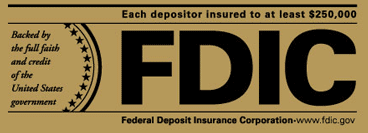
FDIC Resource Center
What is the FDIC?
The Federal Deposit Insurance Corporation (FDIC) is a United States government agency that was established in 1933. After many banks failed during the Great Depression, Congress passed the Glass-Steagall Act which created the FDIC. The FDIC provides insurance on depositors' funds held at financial institutions.
What is the purpose of FDIC deposit insurance?
 If a financial institution fails, the FDIC guarantees that “deposit insurance covers the balance of each depositor's account, dollar-for-dollar, up to the insurance limit, including principal and any accrued interest through the date of the insured bank's closing.”1
If a financial institution fails, the FDIC guarantees that “deposit insurance covers the balance of each depositor's account, dollar-for-dollar, up to the insurance limit, including principal and any accrued interest through the date of the insured bank's closing.”1
For more information on FDIC coverage, check out the following resources:
To speak with a deposit insurance specialist at the FDIC, call 877-ASK-FDIC (275-3342).
Read the latest issue of FDIC Consumer News. This newsletter provides practical guidance on how to become a smarter, safer user of financial services. Each issue offers helpful hints, quick tips, and common-sense strategies to protect and stretch your hard-earned dollars.

1The FDIC Website
Worried about the limitations of FDIC coverage?
Benchmark has the answer!
If your personal wealth is significantly more than $250,000, ask your Benchmark branch manager about CDARS or the Certificate of Deposit Account Registry Service®. Benchmark joined this special network in order to provide customers like you better access to FDIC coverage for all of your money. For detailed information on CDARS, check out our Frequently Asked Questions.






